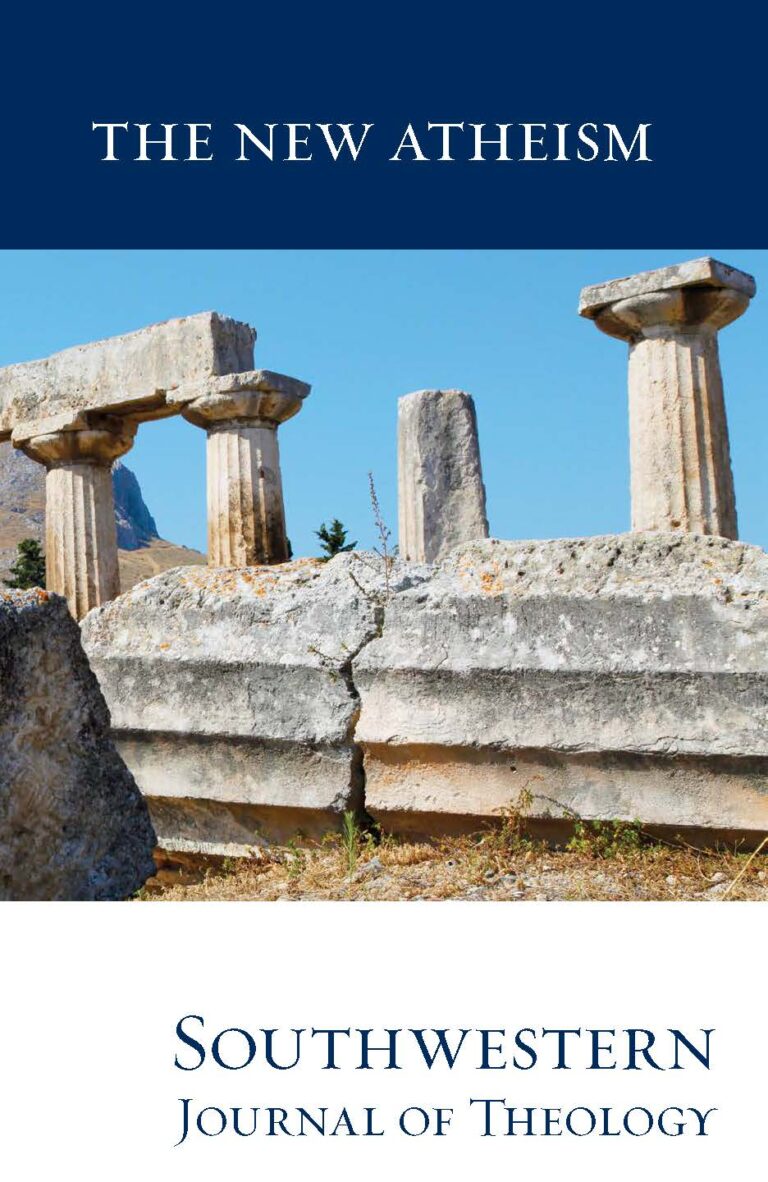
The New Atheism
Southwestern Journal of Theology
Volume 54, No. 1 – Fall 2011
Managing Editor: Malcolm B. Yarnell III
By Gregory A. Wills. New York: Oxford University Press, 2009. 566 pages. Hardcover, $35.00.
The sesquicentennial of Southern Baptist Theological Seminary is a significant milestone in Baptist history. Wills, one of its professors of church history, has labored prodigiously to produce a sesquicentennial history.
Like many institutional histories, the book is organized around the nine presidencies (Boyce, Broadus, Whitsitt, Mullins, Sampey, Fuller, McCall, Honeycutt, and Mohler). Three chapters are devoted to Boyce with one being shared with Broadus. Two chapters each are given to Mullins, McCall, and Honeycutt. Sampey and Fuller share a chapter, and Whitsitt and Mohler have one.
To a large extent the volume is based on ground-breaking use of unpublished letters by and to Southern Seminary leaders. Trustee minutes and Baptist state papers are also utilized, but not the three histories of the Southern Baptist Convention (SBC).
Predominating attention is given to doctrinal controversy. Teaching methods (such as the long used recitation method), publications by faculty members, student life, and the ministries of alumni (pastors, church staff members, teachers, missionaries, chaplains, et al) receive scant attention.
Certain questions and omissions call for answers. (1) Despite the high degree of faculty participation in governance, the exercise of presidential authority became an issue as early as the Mullins administration (286). Why? (2) Wills gives little attention to the policy of faculty inbreeding, which—for the School of Theology— extended from C.H. Toy (1869) to William A. Mueller (1948) and Eric C. Rust (1953) (350). (3) Although carefully reporting in great detail the 1958–1959 controversy (McCall vs. 13 professors) (357–404), the author passes over the rebuilding of the faculty as if it were automatic or incidental and posits instead the dubious theory of a “Prague Spring” of Southern Baptist liberalism (405–07). Absent is treatment of the significant work of Penrose St. Amant, Ray Summers, and Wayne E. Oates in saving the accreditation and restoring confidence. (4) Can Wills’ tracing of the anti-segregation stance implied in Southern’s invitation to Martin Luther King, Jr., to deliver the Gay Lectures (1962) as being an expression of “progressivism” (i.e., theological liberalism) (413–17) be compatible with the later stance against racism taken by Richard Land and the Ethics and Religious Liberty Commission? (5) Since Southern was not the only SBC seminary after 1925, does not the relationship among the SBC seminaries deserve more attention, especially the struggles over Cooperative Program allocations and curriculum development?
A.T. Robertson’s publications and scholarship are indeed acknowledged, and the writings of C.H. Toy, E.Y. Mullins, W.O. Carver, Harold W. Tribble, J.B. Weatherspoon, and Dale Moody are treated, perhaps because they were/are controversial, but authors such as E.C. Dargan, W.J. McGlothlin, Gaines S. Dobbins, E.A. McDowell, H.H. Barnette, Rust, and Oates lack coverage.
Wills’ book is more thoroughly researched and more theological than Mueller’s A History of Southern Baptist Theological Seminary (1959), is less adequate as to curriculum and alumni than Mueller’s The School of Providence and Prayer: A History of New Orleans Baptist Theological Seminary (1969), and is more theological and less complete as to seminary personnel than Robert A. Baker’s Tell the Generations Following: A History of Southwestern Baptist Theological Seminary, 1908–1983 (1983).
Baptists are indebted to Wills for providing a detailed and readable examination of the theological history of Southern Seminary from its heroic founders—Boyce, Broadus, Manly, and Williams—with their struggles during and after the Civil War to its first decade of the 21st century as “an evangelical and Southern Baptist seminary” (536) with an all-time high enrollment (546).
But it is difficult to avoid what seems to be the unstated but permeating and governing thesis of the book, namely, that Southern was on the right track, despite financial hardships, for its first forty years but from 1899 to 1994 was going in the wrong direction (being subject to the dangers of the authority of experience, historical criticism of the Bible, and liberalism/modernism [treated as synonyms]) until it was restored to its true foundation (biblical inerrancy, Dortian Calvinism, and gender complementarianism). Those who accept that thesis will likely find this volume to be more than sufficient, whereas those who do not will continue to look for the rest of the story.





